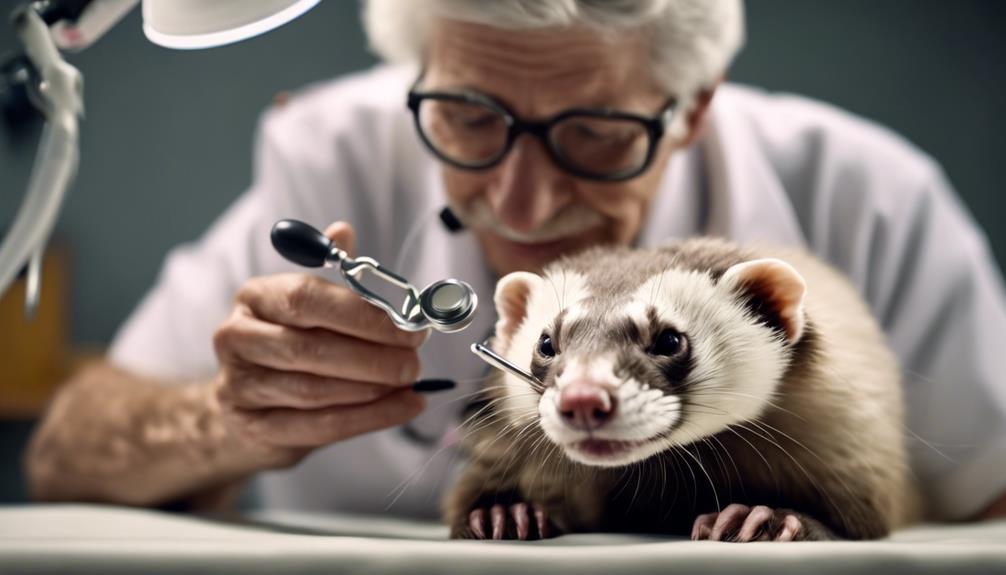When to Consider Special Accommodations for Senior Ferrets

As ferrets age, they may develop health issues that require special care and accommodations. Some signs that your senior ferret may need extra attention include changes in eating or drinking habits, decreased activity levels, weight loss, dental problems, difficulty moving around, and changes in behavior or temperament. If you notice any of these signs, it's important to consult with a veterinarian who can help you develop a care plan tailored to your senior ferret's needs.
Understanding and addressing your senior ferret's changing needs can help ensure they have a comfortable and happy life as they age. Providing a safe and comfortable environment, a nutritious diet, regular veterinary check-ups, and plenty of love and attention can all help support your senior ferret's well-being. By staying vigilant for signs that your ferret may need special accommodations, you can help them enjoy their golden years to the fullest.
Signs of Aging in Ferrets
As ferrets age, they may exhibit subtle changes in their behavior and physical appearance that indicate the onset of senior years. Health monitoring becomes crucial during this period to ensure their well-being. Regular veterinary check-ups are essential to catch any age-related issues early on. It's recommended to keep a close eye on their weight, dental health, and mobility, as these can be affected by aging.
Dietary adjustments are another key aspect to consider for senior ferrets. As they age, their nutritional needs may change, requiring modifications to their diet. Switching to a senior ferret food formula can help address their changing requirements. Additionally, ensuring they've access to fresh water at all times is vital for their hydration, especially as they may become less active with age.
Changes in Behavior

As ferrets age, their behavior may exhibit noticeable changes. Owners might observe unusual sleep patterns, with senior ferrets sleeping more than usual or experiencing insomnia.
Additionally, increased aggression levels can sometimes manifest in older ferrets, which may require adjustments in handling and interaction to ensure their well-being.
Unusual Sleep Patterns
During their golden years, senior ferrets may exhibit unusual sleep patterns, signaling potential changes in behavior that warrant attention and care. Sleep disturbances, such as insomnia or increased nighttime activity, can be common in aging ferrets.
If you notice your senior ferret having difficulty sleeping through the night or being more active during odd hours, it could indicate underlying health issues or discomfort. On the other hand, changes in nap frequency, either an increase or decrease, might also be observed.
Understanding and accommodating these shifts in their sleep patterns are crucial for maintaining their well-being. Providing a comfortable, quiet sleeping environment and consulting with a veterinarian to address any health concerns can help senior ferrets navigate these changes with comfort and support.
Increased Aggression Levels
Senior ferrets experiencing increased aggression levels may exhibit changes in behavior that require careful observation and appropriate intervention. Hormonal changes in senior ferrets can sometimes lead to heightened aggression levels, causing them to act out towards their owners or other pets. Behavioral training can be beneficial in managing and reducing these aggressive tendencies. It is essential to consult with a veterinarian or an animal behaviorist to develop a tailored plan for addressing the ferret's aggression. Patience, consistency, and positive reinforcement are key components of successful behavioral training. By understanding the underlying causes of the aggression and implementing appropriate strategies, pet owners can help their senior ferrets live more peacefully and comfortably in their golden years.
| Signs of Increased Aggression Levels | Possible Interventions | Behavioral Training Tips |
|---|---|---|
| Biting or hissing at owners | Consult a veterinarian | Use positive reinforcement techniques |
| Fighting with other pets | Consider hormonal treatments | Establish a consistent routine |
| Increased territorial behavior | Provide enriching environments | Redirect negative behaviors |
Physical Health Concerns

Understanding the physical health concerns of elderly ferrets is crucial for providing proper care and support as they age. Senior ferrets may experience mobility challenges, making it essential to create an environment that's easily navigable for them. To help alleviate any discomfort, pain management strategies such as providing soft bedding and ramps can be beneficial. Additionally, weight management plays a key role in maintaining their overall health. Monitoring their diet and ensuring they receive adequate exercise can help prevent obesity-related issues.
Dental care is another important aspect of senior ferret health. As ferrets age, they may develop dental problems, such as tartar buildup or tooth decay. Regular dental check-ups and providing appropriate chew toys can help keep their teeth in good condition. By addressing these physical health concerns proactively, caregivers can help senior ferrets lead comfortable and fulfilling lives in their golden years.
Cognitive Decline

Addressing cognitive decline in elderly ferrets involves implementing strategies to support their mental well-being and overall quality of life as they age. Memory loss, confusion, learning difficulties, and disorientation are common issues that senior ferrets may experience. To help these furry friends cope with cognitive decline, caregivers can create a familiar environment with consistent routines to reduce confusion.
Providing mental stimulation through interactive toys and games can help keep their minds active. As ferrets age, they may struggle with learning new tasks or remembering familiar ones. Patience and positive reinforcement are essential when working with a ferret experiencing cognitive decline.
Keeping their living space simple and easily navigable can help minimize disorientation. Additionally, regular veterinary check-ups are crucial to monitor cognitive changes and address any underlying health issues promptly.
Environmental Modifications

Modifying the environment can significantly enhance the well-being and comfort of elderly ferrets. When considering environmental modifications for senior ferrets, it's essential to create a space that caters to their specific needs. Here are some key adjustments to consider:
- Cage modifications: As ferrets age, they may struggle with climbing or navigating high platforms. Lowering shelves or providing ramps can facilitate easier access to different levels within their enclosure.
- Senior playtime: While older ferrets may have reduced energy levels, engaging them in gentle play sessions can help maintain their physical and mental health. Interactive toys and short, supervised playtimes can keep them active without causing exhaustion.
- Comfortable bedding: Providing soft, supportive bedding is crucial for senior ferrets to rest comfortably. Opt for materials that are gentle on their aging bodies, such as fleece or memory foam.
- Safe environment: Ensure the living space is free of hazards that could pose risks to older ferrets. Remove any small items they could ingest, secure electrical wires, and eliminate any sharp edges that may cause injuries.
Adjusting Daily Routine

Senior ferrets may benefit greatly from adjustments to their daily routine as they age. This can involve being more flexible with their schedule, simplifying feeding routines to accommodate any dietary changes, and ensuring they have comfortable sleeping arrangements that meet their evolving needs.
Routine Flexibility for Seniors
With age, ferrets may benefit from gentle adjustments to their daily routines to accommodate their changing needs and promote their well-being. Here are some ways to provide routine flexibility for senior ferrets:
- Varied Exercise Options: Offer low-impact activities tailored to their abilities.
- Increased Social Interaction: Encourage bonding time with familiar companions.
- Engage in Mental Stimulation: Incorporate puzzle toys or hide treats to keep their minds active.
- Provide Enrichment Activities: Create new environments or introduce novel experiences.
- Adjust Playtime: Shorter but more frequent play sessions can help prevent fatigue.
Simplifying Feeding Schedules
To simplify feeding schedules for senior ferrets, consider streamlining their daily routine with consistent meal times. Understanding your ferret's food preferences is key to creating a suitable meal plan that meets their dietary needs.
Senior ferrets may have specific requirements, such as softer foods or smaller portions, so adjusting feeding frequency accordingly is essential. Meal planning should take into account their age-related changes in metabolism and digestion.
By establishing a regular feeding schedule, you can help maintain their health and weight more effectively. Monitoring their appetite and response to different foods can also guide you in providing the best nourishment for your senior ferret.
Comfortable Sleeping Arrangements
Creating a comfortable sleeping environment for your aging ferret involves strategically adjusting their daily routine to promote restful sleep and overall well-being. To ensure your senior ferret has a cozy and peaceful place to rest, consider the following:
- Cozy hideaways: Provide soft bedding or blankets in secluded areas for your ferret to nestle in.
- Elevated platforms: Offer elevated spots for your ferret to sleep on, as they may find it easier to rest away from the ground.
- Warmth: Ensure the sleeping area is warm and draft-free to keep your senior ferret comfortable.
- Nighttime routine: Establish a consistent bedtime routine to help your ferret relax and unwind before sleep.
- Adjustments: Be observant of your ferret's changing needs and adjust their sleeping arrangements accordingly for optimal comfort.
Veterinary Consultation

Upon noticing changes in a senior ferret's behavior or health, seeking a veterinary consultation promptly is crucial for proper assessment and care. A veterinarian can provide valuable insights into dietary adjustments tailored to the ferret's changing nutritional needs. They may recommend specific exercise routines suitable for senior ferrets to maintain their mobility and overall health. Additionally, the vet can assist in medication management, ensuring that any prescribed treatments are administered correctly and monitoring their effectiveness.
In some cases, senior ferrets may benefit from mobility aids to help them navigate their environment more comfortably. A vet consultation is essential for determining the most appropriate aids, such as ramps or soft bedding, to support the ferret's well-being.
Veterinary consultations play a vital role in the holistic care of senior ferrets, addressing not only immediate health concerns but also providing guidance on long-term wellness strategies. By seeking timely veterinary advice, ferret owners can ensure their beloved pets receive the specialized care they need in their senior years.
Frequently Asked Questions
Are There Any Specific Dietary Recommendations for Senior Ferrets?
When it comes to dietary recommendations for senior ferrets, it's vital to remember that age is just a number. Providing a balanced diet rich in protein, fiber, and essential nutrients can support their health and vitality.
How Can I Help My Senior Ferret Maintain a Healthy Weight?
To help a senior ferret maintain a healthy weight, engage them in gentle exercise routines like supervised playtime. Monitor their food intake, choosing a balanced diet for weight management. Keeping them active supports healthy aging and overall well-being.
Are There Any Supplements That Can Benefit Senior Ferrets?
Senior ferrets benefit from gentle exercise to maintain mobility. Ferret arthritis supplements like glucosamine can aid in joint health. Always consult a vet before introducing new supplements. Care and attention are essential for senior ferrets' well-being.
What Are Some Common Dental Issues in Senior Ferrets and How Can They Be Prevented?
Regular brushing is vital for senior ferrets to prevent common dental issues like tartar buildup and gum disease. Prevention techniques include providing chew toys, a balanced diet, and regular vet check-ups. Maintaining good oral hygiene enhances a senior ferret's overall well-being.
Is There a Recommended Age for Starting Regular Senior Ferret Check-Ups With a Veterinarian?
When considering senior ferret care, regular check-ups with a veterinarian are crucial for monitoring health. Starting these visits early can help catch potential issues sooner. Just like aging humans, senior ferrets benefit from proactive healthcare.











